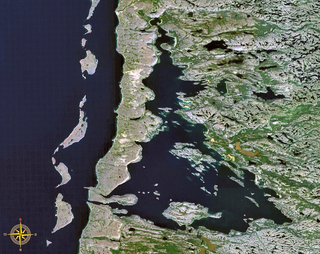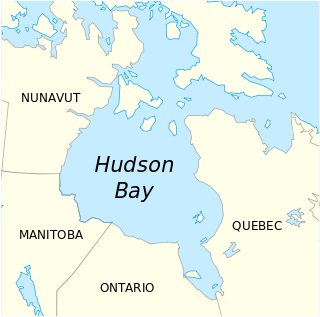
The Labrador Peninsula is a large peninsula in eastern Canada. It is bounded by the Hudson Bay to the west, the Hudson Strait to the north, the Labrador Sea to the east, and the Gulf of Saint Lawrence to the southeast. The peninsula includes the region of Labrador, which is part of the province of Newfoundland and Labrador, and the regions of Saguenay–Lac-Saint-Jean, Côte-Nord, and Nord-du-Québec, which are in the province of Quebec. It has an area of 1,400,000 km2 (541,000 sq mi).

The Ashuapmushuan River is a river in the Saguenay–Lac-Saint-Jean region of the Canadian provinces of Quebec. It starts at the outlet of Lake Ashuapmushuan, and flows first in a north-easterly direction for about 30 kilometres (19 mi) whereafter it continues south-east to Saint-Félicien. There it drains into Lac Saint-Jean of which it is the third largest tributary after the Peribonka and Mistassini Rivers. The river is 181 kilometres (112 mi) long but its source is 266 kilometres (165 mi) from its mouth.
Eau Claire is the name of a number of locations and features in North America. The name is pronounced as if it were spelled "O'Clare".

The Rivière du Loup is a river in eastern Quebec, Canada, which empties on the south shore of Saint Lawrence River at the city of Rivière-du-Loup, which is part of the regional county municipality (RCM) Rivière-du-Loup, in the administrative region of Bas-Saint-Laurent.

Umiujaq is a northern village near the eastern shore of Hudson Bay in Nunavik in northern Quebec, Canada. The village was established in 1986 by Inuit from Kuujjuarapik, 160 km to the south, who decided to relocate away from the area affected by the James Bay Hydro-electric Project. The population in the Canada 2016 Census was 442.
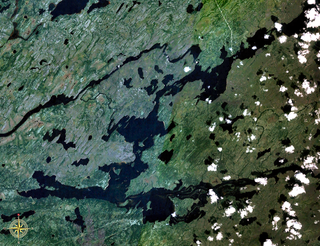
Lake Nemiscau is a freshwater lake, located in the municipality of Eeyou Istchee James Bay, in the administrative region of Nord-du-Québec, in north-western Quebec, in Canada. The lake Nemiscau is crossed by Rupert River.

The Little Whale River is a river in Nunavik, Quebec, Canada. With an area of 15,900 square kilometres (6,100 sq mi), it is ranked as the 35th largest river basin in Quebec.
The West Branch Little Black River is a short river in Quebec and northern Maine.
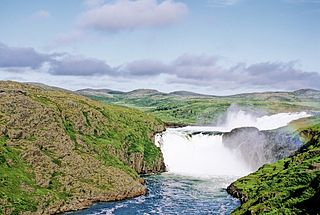
Tursujuq National Park is a National Park of Quebec, Canada. Its creation was announced by the Province of Quebec on December 14, 2012, and officially established on July 18, 2013. Located on the east side of Hudson Bay near the Inuit village of Umiujaq, the park is one of North America's largest, with an area of 26,100 km2. It will be managed by the Kativik Regional Government, which emcompasses most of the Nunavik region of Quebec.

The Rivière de Puvirnituq is a river in Kativik, Nord-du-Québec, Quebec, Canada. The river flows 389 kilometres (242 mi) from its source at an unnamed lake to Hudson Bay at the village of Puvirnituq. Its watershed encompasses 28,500 square kilometres (11,000 sq mi). The name of the river comes from the Inuktitut "smells like rotten meat."

The Nastapoka River is a tributary of East coast of Hudson Bay, flowing in the administrative region of Nord-du-Québec, in Quebec, Canada. This river is one of the most important river of Nord-du-Québec, the 39th of Quebec because its watershed of 13,400 kilometres (8,326.37 mi).
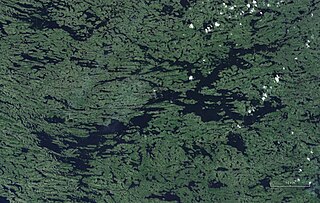
Lacs des Loups Marins is a lake in the north of the province of Quebec in Canada. It is located about 150 km east of Hudson Bay and about 20 km northeast of Lac à l'Eau Claire.

Lake Nemenjiche is a freshwater body of the southern part of Eeyou Istchee Baie-James, in the administrative region of Nord-du-Québec, in the province of Quebec, Canada.

The Eau Jaune Lake is a freshwater body of the Eeyou Istchee Baie-James, in Jamésie, in the administrative region of Nord-du-Québec, province of Quebec, in Canada. This lake extends entirely into the townships of Brongniart and Rasles.

The La Dauversière Lake is a freshwater body integrated into a set of lakes designated "Obatogamau Lakes, in the territory of Eeyou Istchee James Bay (municipality), in the administrative region of Nord-du-Québec, province of Quebec, in Canada. This lake extends entirely in the township of La Dauversière.

The Chevrier Lake is a freshwater body integrated into a set of lakes designated "Obatogamau Lakes", in the Eeyou Istchee James Bay (municipality) area, in the area of Nord-du-Québec, in the province of Quebec, Canada. This lake extends into the townships of Queylus, La Dauversière, Fancamp and Haüy.
